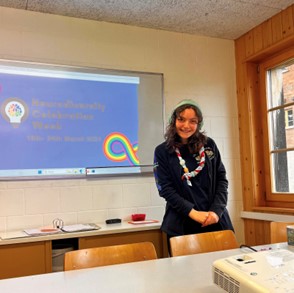How autism has shaped my experience in guiding
Advocate Grace talks to us about her experiences for Autism Acceptance Month
Grace joined Girlguiding as a Rainbow in 2008. Now, aged 20, she's a leader in training and a member of our advocate panel, helping to lead the direction of our advocacy and research.
Grace is passionate about disability inclusion and creating a more accessible world for young women and girls. To celebrate this year’s Autism Acceptance Month, we asked her some questions about her experiences in guiding as an autistic person.
Autism is a lifelong developmental disability that affects how people communicate and interact with the world. It affects people in different ways, and autistic people will have different strengths and weaknesses. The National Autistic Society estimates that 1 in 100 people in the UK are on the autistic spectrum.
‘Every year in April, we celebrate Autism Acceptance Month. It’s a really important time when we can all think about how we can become more inclusive as a society to make those who are autistic more involved and accepted. For me, Girlguiding has been one of the most accepting spaces in my life. Going to guides each week provided me with a safe space to be myself and not worry about what others thought of me. This is a complete difference to my school life, where I was constantly having to mask my behaviours so as not to be seen as the weird kid.’
How has autism affected your guiding experience? Do you think you have had a different experience than others who are not autistic?
‘Yes, definitely. Being autistic poses many challenges that others may not even think about. The unit meeting place can sometimes be a very overstimulating environment with so many excited young people. Even as a leader now, running a unit meeting can become a little bit too chaotic. I am very lucky to have a very supportive team of leaders that will allow me to take a step back if I need to.’
What are your favourite things about guiding?
‘I love that guiding gives me the opportunity to really stretch myself. I never want my disability to hold me back. It gives me a sense of determination to do what others think I could never do. Things can be hard sometimes, but getting involved gives me a sense of fulfilment. I’m currently a member of the advocate panel, as well as volunteering for a season at Our Chalet in Switzerland.’
What is it like to be an advocate and autistic?
‘Having autism can make my role as advocate difficult. Communication differences can make it hard to interact in a neurotypical way. I’m lucky to have a supportive team of fellow advocates who can help explain things to me or help me get my point across to others. So many people we meet in our role are very understanding and patient.’
What would you like people to understand about autism?
‘Every autistic person is different. If you’ve met one autistic person you’ve only met one autistic person. If you meet someone who is autistic, take the time to listen to them and find out how you can support them. Even making the smallest change to how you do something could make a massive difference for that person.’
Is there anything else you would like people to know?
- ‘People shouldn’t assume what I can and can’t do. If I don’t get the opportunity to try something, I’ll never know!’
- 'It can be hard to get an autism diagnosis as a girl. You can offer accommodations and adjustments to anyone in your unit who needs them, whether or not they’ve been diagnosed. Just remember not to make any assumptions, and be led by the needs and preferences of the person.'
- ‘Autistic people should be celebrated! We have a lot to offer to the world.’

We’re so grateful to have Grace in our guiding community and that she shared her experiences with us!
More resources about autism and guiding
- Supporting autistic members - how to include autistic girls, young women and volunteers in guiding. We created this guidance with the National Autistic Society.
- Guidance on including autistic members and volunteers - more guidance, links and resources on supporting autistic members.
- Adjustments for disabled members - removing the barriers experienced by disabled people to make sure everyone is fully included and has independence, choice and control.
- Girls’ Attitudes Survey 2023 – our research asking girls and young women how they feel about their everyday lives and the issues facing them today. The survey highlights the difference in responses from neurodiverse girls.